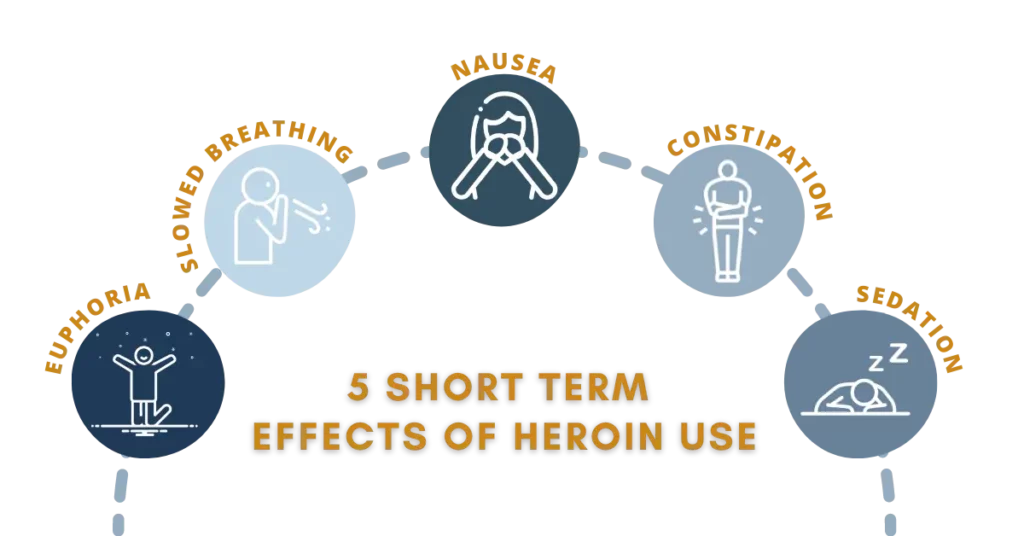Heroin is a potent and highly addictive narcotic that has emerged as a significant public health concern in recent years. According to the National Survey on Drug Use and Health, approximately 450,000 Americans reported using heroin in the past year. The use of heroin is associated with a wide range of short term physical and psychological side effects, as well as many devastating long-term effects. The best way to avoid these negative effects is to abstain from using heroin altogether.
In this blog, we will discuss the short term effects of heroin use, the long-term effects of heroin use, the changes in your physical and mental health from heroin use, and treatment options for heroin addiction.

5 Short Term Effects of Heroin
Heroin is a highly addictive drug that can have significant short term and long-term effects on an individual’s physical and mental health. While there can be many different effects of heroin use, here are five of the most common short term effects of heroin:
Euphoria
The euphoric high that follows heroin usage is among the most well-known short term consequences of the substance. Dopamine, a neurotransmitter responsible for feelings of pleasure, is released when heroin binds to opioid receptors in the brain. Heroin use can produce a powerful euphoria that might last for several minutes. Users may experience a surge of warmth and pleasure.
Breathing Depression
Utilizing heroin can result in respiratory depression, a condition where breathing slows down or stops altogether. Particularly in cases of a heroin overdose, respiratory depression can be fatal. Heroin use causes the central nervous system to be suppressed, which slows down respiration and heart rate. Hypoxia, a condition in which the brain doesn’t get enough oxygen to operate correctly, can result from excessive breathing.
Nausea and Diarrhea
Heroin users may experience nausea and vomiting after using the drug, which can be uncomfortable and unpleasant. These symptoms result from the effects of the drug on the digestive system, which can become sluggish. Moreover, people may occasionally develop constipation or cramps in their abdomen.
Constipation
Heroin use can cause the digestive system to slow down, resulting in constipation. If left untreated, this can result in discomfort and pain in the abdomen and other health issues.
Sedation
Using heroin can also make you feel sleepy and sedated. This poses a risk since it may cause poor judgment, sluggish reflexes, and in severe cases, coma. Heroin can also make users nod off or pass out while engaging in an activity like driving, which is exceedingly risky.
Long-Term Effects of Heroin Use
Heroin use has numerous long-term effects that can severely impact a person’s physical, mental, and social well-being. Prolonged use of heroin can lead to a variety of health issues that can persist even after a person has stopped using the drug. Here are some of the long-term effects of heroin:
- Heroin is a highly addictive substance, and continued usage can result in heroin addiction. Addiction can alter how the brain works, making stopping the drug challenging.
- Heroin can cause damage to the liver and kidneys. Heroin usage over time can harm the liver and kidneys, resulting in liver and kidney disease.
- Heroin usage over time can result in vein collapse, infections, and other consequences.
- Infections, blood clots, and weak heart muscles are just a few heart issues that can develop due to long-term heroin use.
- Prolonged heroin use can result in cognitive impairment, affecting memory, attention span, and decision-making ability.
- Heroin usage can result in hormonal disorders, which can cause various medical issues, such as infertility and sexual dysfunction.
- Long-term heroin use can alter the brain and lead to mental health disorders, contributing to sadness and anxiety.
- Heroin addiction can lead to many social and financial problems, such as losing a job, hurting relationships, and getting in trouble with the law.

Heroin Addiction
When someone uses heroin regularly over time, they can become dependent on it, which can result in them developing heroin use disorder, a dangerous and frequently fatal disorder.
When you take heroin, your brain makes more dopamine, which makes you feel good and happy. It gets harder to feel joy without the drug as the brain becomes accustomed to it over time. As a result, dependency forms, characterized by intense cravings for the drug, withdrawal symptoms when the substance is not taken, and a lack of control over drug usage.
It can be challenging for people to stop using heroin without a treatment center because of some of the long-term impacts of the substance, such as modifications to brain chemistry and physical health. Severe heroin withdrawal symptoms include anxiety, sadness, insomnia, muscle and bone pain, vomiting, diarrhea, and nausea.
- Heroin addiction can negatively affect a person’s physical and mental health, interpersonal connections, and general quality of life.
- In some cases, withdrawal symptoms can be life-threatening, mainly if the individual has been using large amounts of heroin for an extended period of time.
- Also, it might result in monetary difficulties, legal troubles, and a higher chance of catching infectious diseases, including HIV/Aids, Hepatitis B, and Hepatitis C.
Changes in Physical Appearance from Heroin
Heroin usage can physically alter a person’s look, one of the most apparent short term effects of Heroin use. If drug usage continues, these changes might sometimes happen right away and get progressively worse. Here are some of the ways your physical appearance can be changed by heroin:
Pinned Pupils
The constriction of the pupils, often known as “pinned” or “tiny” pupils, is one of the most apparent side effects of heroin usage. This happens due to heroin’s suppression of the neurological system, which also affects the area of the brain that regulates pupil dilation. As a result, a person’s eye color changes, making their pupils appear smaller.
Flushed Skin
Heroin usage can result in flushed skin, which is red and heated to the touch. This is because the medication can widen blood vessels, increasing blood flow to the skin’s surface. The skin may have a rosy or crimson color.
Itching
Heroin usage can result in “Heroin itch,” a severe and enduring irritation. The drug’s effects on the central nervous system, which can trigger histamine release and result in itching, cause this itch.
Sweating
Even in relaxed or comfortable circumstances, heroin use can result in profuse sweating. A person may get hot and sweat due to the drug’s nervous system effects, which can result in noticeable physical changes.
Heroin Use & Mental Health Problems
Heroin is a highly addictive drug that belongs to the class of opioids. It is known to cause various physical and psychological health problems, including addiction, dependence, and overdose. Heroin usage can lead to a range of mental health issues, some of which go beyond the typical symptoms of sadness and anxiety. Some of the other mental health issues it can cause are:
Paranoia
Heroin usage can make users feel suspicious and paranoid, giving them the impression that they are being observed or pursued.
Delusions
Users of heroin may occasionally develop delusions, which are erroneous ideas that are not grounded in reality.
Psychosis
Chronic heroin use can cause psychosis, a severe mental illness marked by a loss of reality and the emergence of delusions and hallucinations.
Mood Swings
Extreme mood swings are a side effect of heroin usage that can be challenging to control.
Decision-Making
Memory, attention, and decision-making skills can all be affected by heroin use’s adverse effects on cognitive function.
It is important to remember that people who had mental health problems before taking heroin can experience increased symptoms as a result of the substance. Moreover, heroin users are more likely to experience co-occurring mental health conditions such as sadness, anxiety, and stressful situations.

Heroin Addiction Treatment Options at Asheville Recovery Center
Heroin usage can have a severe short term impact on a person’s physical appearance. The medication can have severe side effects, including itching and diarrhea and changes in skin tone, perspiration patterns, and pupil size. If you or a loved one is battling heroin addiction, contact Asheville Recovery Center today to learn more about our substance abuse treatment programs.
Our comprehensive addiction treatment programs at Asheville Recovery Center include detox, counseling, and aftercare services. We are aware of the difficulties with addiction and how it affects mental health. Our in-depth treatment plans address substance use disorders and co-occurring mental health conditions, giving our clients the tools to experience long-lasting recovery.





